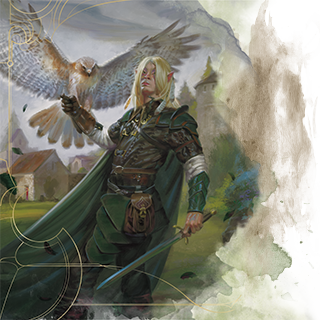
You have taken a sacred vow to forswear material possessions.
Benefit: See the table below (as well as the explanation following it) for details of benefits.
Special: To fulfill your vow, you must not own or use any material possessions, with the following exceptions: You may carry and use ordinary (neither magic nor masterwork) simple weapons, usually just a quarterstaff that serves as a walking stick. You may wear simple clothes (usually just a homespun robe, possibly also including a hat and sandals) with no magical properties. You may carry enough food to sustain you for one day in a simple (non-magic) sack or bag. You may carry and use a spell component pouch. You may not use any magic item of any sort, though you can benefit from magic items used on your behalf—you can drink a potion of cure serious wounds a friend gives you, receive a spell cast from a wand, scroll, or staff, or ride on your companion’s ebony fly. You may not, however, “borrow” a cloak of resistance or any other magic item from a companion for even a single round, nor may you yourself cast a spell from a scroll, wand, or staff.
If you break your vow, you immediately lose all benefits of this feat. You may not take another feat to replace it. To gain back your benefits, you must retake the vow and make penance for your indiscretions at the DM's discretion (e.g. 3 day hunger strike, a full day of mediation, etc.)
Vow of Poverty
|
Vow Level |
Benefit |
|
1st |
AC bonus +1 |
|
2nd |
Exalted strike +1 (magic) |
|
3rd |
AC bonus +2, endure elements |
|
4th |
Ability score enhancement +1 |
|
5th |
- |
|
6th |
AC bonus +3 |
|
7th |
Ability score enhancement +1, Resistance +1, |
|
8th |
- |
|
9th |
AC bonus +4 |
|
10th |
Ability score enhancement +1, Exalted strike +2 (good, special type) |
|
11th |
- |
|
12th |
AC bonus +5 |
|
13th |
Ability score enhancement +1, Resistance +2 |
|
14th |
Exalted strike +3 |
|
15th |
AC bonus +6 |
|
16th |
Ability score enhancement +1 |
|
17th |
Exalted strike +4, resistance +3 |
|
18th |
AC bonus +7 |
|
19th |
Ability score enhancement +1 |
|
20th |
Exalted strike +5 |
In many cultures and belief systems, the height of purity is embodied in an ascetic lifestyle that involves forswearing all material possessions. Such a life is hard for most D&D characters even to imagine, since their possessions—particularly their magic items—are such an important part of their capabilities. A character who swears a vow of poverty and takes the appropriate feats, Sacred Vow and Vow of Poverty, cannot own magic items, but can gain certain spiritual benefits that can help outweigh the lack of those items. The level at which the character swears the vow (and takes the appropriate feats) is irrelevant; you gain vow levels each character level AFTER taking the feat.
AC Bonus: A 1st-level ascetic receives a +1 exalted bonus to their Armor Class. The bonus increases to +2 at 3rd level, and thereafter increases by +1 for each 3 character levels. This does not stack with an armor bonus.
Endure Elements: A 3rd-level ascetic is immune to the effects of being in a hot or cold environment. He can exist comfortably in conditions between –50 and 140 degrees Fahrenheit
without having to make Constitution saves (as described in the Dungeon Master’s Guide).
Exalted Strike: At 4th level, an ascetic gains a +1 enhancement bonus on all their attack and damage rolls. In effect, any weapon the character wields becomes a +1 magic weapon. This enhancement bonus rises to +2 at 10th level, to +3 at 14th level, to +4 at 17th level, and to +5 at 20th level. At 10th level, any weapon damage the character deals is also considered to be good-aligned, and bypasses the resistances of any special types (silvered, etc.).
Resistance: At 7th level, an ascetic gains a +1 resistance bonus to all saving throws. This bonus increases to +2 at 13th level, and to +3 at 17th level.
Ability Score Enhancement: At 4th level, an ascetic increases one of their ability scores by 1, to a maximum of 20. They can this benefit again at levels 7, 10, 13, 16, and 19.
OTHER RAMIFICATIONS OF POVERTY
Characters who have forsaken material possessions may find themselves at a marked disadvantage when it comes to certain necessary expenses, such as expensive material components. One option is for ascetic characters to beg components from other party members, who are probably gaining as much benefit from having the spell cast as the caster is. Alternatively, an ascetic spellcaster can sacrifice experience points in place of expensive components, with 1 XP equivalent to 5 gp value of components.
Having a character in the party who has taken a vow of poverty should not necessarily mean that the other party members get bigger shares of treasure! An ascetic character must be as extreme in works of charity as much is in self-denial. The majority of their share of party treasure (or the profits from the sale thereof ) should be donated to the needy, either directly (equipping rescued captives with gear taken from their fallen captors) or indirectly (making a large donation to a temple noted for its work among the poor). While taking upon themselves the burden of poverty voluntarily, an ascetic recognizes that many people do not have the freedom to choose poverty, but instead have it forced upon them, and seeks to better those unfortunates as much as possible.









Comments